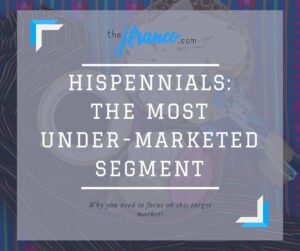Are you having trouble capturing clients with a broad marketing strategy? You should consider targeting Hispennials.
In Houston alone, there are over 2.1 million Latinos. Likewise, Hispennials make up the second largest millennial group in Houston.
Hispanic Millennials are the most influential subgroup among the Hispanic demographic. Marketers have coined the term Hispennials to refer to the Hispanic Millennial cohort.
Hispennials are Latino millennials ages 20 to 38. Although, some even consider millennials starting at 1979. Regardless of where you define millennials; Nevertheless, Hispennials are the most ignored target market. It’s an underused goldmine.
Does your marketing reach the Latino market? Have you ever considered a multicultural and multilingual approach in your communication? Your broad message strategy may not strike a chord amongst Hispennials.
Your marketing should include targeting the Hispennial market.
And here is why…
- Pew Research reports the Hispanic population is expected to grow 167% through 2050 according to the United States Census.
- Similarly, Hispanic income continues to increase along with their purchasing power.
- U.S. Latino households earning $50,000 or more, are growing at a faster rate than the national average.
- On average, Hispanic incomes range from $50 -$100K (Fite, 2014).
- The population growth and income increase pairs with the fact that education for the demographic has also increased, and Hispanics account for the largest minority segment in college.
- The National Center for Education Statistics reports increases in Associate degrees doubled from 118%, Bachelors by 87%, 7% in conferred Master’s, and 60% of doctoral degrees among Hispanics.
- Meaning, more affluent millennials.
- Hispanic entrance into the workforce has increased because of the increase in education becoming entrenched in society and having greater influence.
More Education More Buying Power
“The Hispanic buying power surpassed the African American buying power in 2006” (Cartagena, 2013, p. 56). Buying power comes from larger households and higher spending habits of Hispanics (p.56). The Hispanic buying power is forecasted to benefit over seven industries such as food, retail, financial services, real estate, transportation, entertainment, and media according to IBIS World (p. 57). Values, beliefs, and preferences highly influence the Hispanic buying power.
Values, beliefs, and preferences of Hispennials
63% of Hispanics in the United States are from Mexico, 7% from Central America and 30 % are from South America and the Caribbean. Language, religion and a history of part of the American continent shape the values of Hispanics.
Hispanics predominantly share the same religion, cultural background, taste in food, music, and entertainment, as well as political views and beliefs (Cartagena, 2013).
Hispanics are highly influenced by their ethnicity and is a part of their self-identity in comparison to other minorities. Because Hispanic self -identity is tied to ethnicity, Hispanics do not assimilate to U. S. culture instead; they add American ways to their traditional heritage and culture The core value of the traditional heritage and culture of Hispanics is family. Therefore, family highly influences preferences.
The 2015 Hispanic Lifestyle and Entertainment Report identified Hispanics devote their leisure time and activity with their family. Activities such as content consumption, dining, and shopping are the primary ways Hispanics use their leisure time. Fitness activity and healthy lifestyle preferences have also increased. Pew Research Center found Hispanics to lead healthier lifestyles and easily adopt the mainstream lifestyle and habits of Americans.
Hispennials average $30 – 35,000 in income, the low income is attributed to their enrollment in education because they see education as necessary. Most Hispennials in the 18-33 age range are college students. Hispennials share the same values, beliefs, and preferences, as their primary demographic group. Another key point, is the group self-identifies with common themes in the current society such as gay marriage, the environment, and politics.
Hispennials are Digital Natives
We sleep with their phones on their beds, while watching, purchasing, and connecting through mobile devices. In the same fashion, we use social media platforms more than any other subgroup or demographic segment. “According to Google” Hispennials “are hungry for content” and marketers should address them through messages that target their cultural dimension: family, heritage, and community using digital messages on multiple social media platforms.
Hispennials yearn for content and social connection because technology has made it easier for them to connect to culture and heritage. Just look at what Coco the movie did for this market. Granted, it capitalized on the importance of culture and family.
4 keys of Crafting Message Strategy for Hispennials
1. Reference Groups
Reference groups and influencers influence Hispanic consumers through culturally relevant messages. However, self-identify, ethnicity and cultural background is the underlying influence that reigns in the behavior of Hispanics.
2. Highly Emotional
Above all, we as Latinos, are a very emotional demographic. Research what big brands have communicated in the past and what made them successful. The most successful brands are those that tug at the heart and soul of the culture and family constructs of Latinos.
3. Mirror Archetypes and Culture
Felipe and Betty Ann Korzenny identify cultural dimensions and archetypes as the cause that affects attitudes and behavior of Hispanics. In their book Hispanic Marketing Connecting with the new Latino consumer, they discuss how marketers need to tap into the emotional benefits to successfully position a brand. With this in mind, messages should understand cultural dimensions and archetypes to influence the attitudes, and behaviors of Hispanics by including Hispanic literature, art, cinema, and music.
4. Genuine and Sincere
Messages need to be sincere and true. They should be crafted in a way that resonates as a typical conversation among Latinos. Keep that in mind when writing out your copy. Use humor and emotion only if it’s not forced.
Traditional marketing no longer applies to Hispanics.
Your message should include nostalgic tones. If possible use an influencer to deliver a bilingual message through educational entertaining short videos. Focus on Instagram and Facebook to deliver you brands messages to this target market. Hispanics preferring Facebook and Instagram to other platforms. Craft content that can reach Hispanics online and through mobile mediums.
Furthermore, this audience is the largest demographic who view the online video with watch times of over eight hours a month compared to non-Hispanics (Nielsen, 2014). Additionally, they have data usage is 16% higher among Hispanics than non-Hispanics. Consider small micro videos of content with targeted messages in your strategy.
So, have I convinced you to start marketing your products or services to Hispennials. Your answer should be yes! Let me know in the comments if you have ever thought of segmenting your messages to reach this goldmine of an audience? Would you consider developing a message strategy just for Hispennials? I’d love to hear your thoughts. In fact, don’t hesitate to reach out to me for help with crafting messages that resonate with Hispennials



Hi,
I am a Florida State licensed air conditioning contractor. I can tell you one thing, which I have learned from many years of experience: Customer feedback is the lifeblood of every successfull business.
P.S. If you would have any feedback on my website, I would appreciate it
Cheers!
Joe